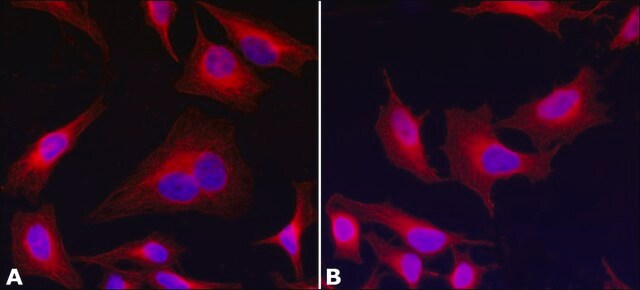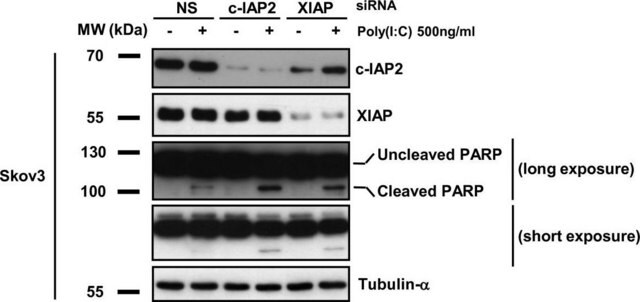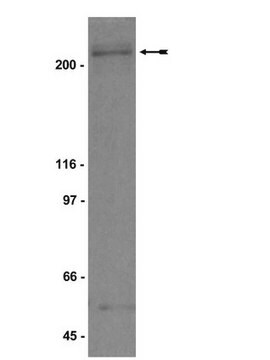SAB1103260
Anti-DCAF15 (567-580) antibody produced in rabbit
IgG fraction of antiserum
Synonym(s):
Anti-C19orf72, Anti-DDB1 and CUL4 associated factor 15
Sign Into View Organizational & Contract Pricing
All Photos(1)
About This Item
UNSPSC Code:
12352203
NACRES:
NA.41
Recommended Products
biological source
rabbit
Quality Level
conjugate
unconjugated
antibody form
IgG fraction of antiserum
antibody product type
primary antibodies
clone
polyclonal
form
buffered aqueous solution
mol wt
antigen ~66 kDa
species reactivity
human
technique(s)
western blot: 1:500-1:2,000
UniProt accession no.
shipped in
dry ice
storage temp.
−20°C
target post-translational modification
unmodified
Gene Information
human ... DCAF15(90379)
General description
DCAF15 (DNA damage binding protein1 (DDB1) and cullin4 (CUL4) associated factor 15) gene in human chromosome, is mapped to 19p13.12. DCAF15 lacks protein interaction domain.
DCAF15 protein is a substrate receptor for E3 ligase. This protein is a part of the cullin 4-RING (CRL4)-DCAF15 E3 ubiquitin ligase.
Immunogen
synthetic peptide corresponding to amino acids 567-580 of human DCAF15
Application
Anti-DCAF15 (567-580) antibody produced in rabbit has been used in western blotting.
Biochem/physiol Actions
DCAF15 (DNA damage binding protein 1 (DDB1) and cullin4 (CUL4) associated factor 15) is the vertebrate ortholog of Saccharomyces pombe chromosome licensing and DNA replication factor 2 (Cdt2) and is required for destruction of Cdt1 during S phase and after DNA damage in human cells.
DCAF15 protein plays a role in RNA splicing and cell apoptosis of various cancer cell lines. This protein is also involved in ubiquitination and degradation of splicing factor RNA binding motif protein 39 (RBM39).
Physical form
Solution in 0.01 M phosphate buffered saline, pH 7.4, containing 15 mM sodium azide.
Disclaimer
Unless otherwise stated in our catalog or other company documentation accompanying the product(s), our products are intended for research use only and are not to be used for any other purpose, which includes but is not limited to, unauthorized commercial uses, in vitro diagnostic uses, ex vivo or in vivo therapeutic uses or any type of consumption or application to humans or animals.
Not finding the right product?
Try our Product Selector Tool.
Storage Class Code
10 - Combustible liquids
WGK
WGK 2
Flash Point(F)
Not applicable
Flash Point(C)
Not applicable
Choose from one of the most recent versions:
Already Own This Product?
Find documentation for the products that you have recently purchased in the Document Library.
Expanding the spectrum of rearrangements involving chromosome 19: A mild phenotype associated with a 19p13.12-p13. 13 deletion
Marangi G, et al.
American Journal of Medical Genetics. Part A, 158(4), 888-893 (2012)
A family of diverse Cul4-Ddb1-interacting proteins includes Cdt2, which is required for S phase destruction of the replication factor Cdt1
Jin J, et al.
Molecular Cell, 23(5), 709-721 (2006)
Zhi Chen et al.
Scientific reports, 7(1), 1175-1175 (2017-04-28)
Cell cycle progression in mammals is strictly controlled by a number of cyclin-dependent kinases (CDKs) and CDK inhibitors (CKIs), the expression of which is often dysregulated in cancer cells. Our previous work revealed that Cullin 4B (CUL4B), a critical component
Xiao Dong et al.
Aging, 13(7), 10603-10618 (2021-04-10)
Epithelial-mesenchymal transition (EMT) is an evolutionarily conserved developmental program that has been implicated in tumorigenesis and confers metastatic properties upon cancer cells. ZEB1 is a master transcription factor that activates the EMT process in various cancers. ZEB1 is reportedly degraded
Tabitha C Ting et al.
Cell reports, 29(6), 1499-1510 (2019-11-07)
Indisulam and related sulfonamides recruit the splicing factor RBM39 to the CRL4-DCAF15 E3 ubiquitin ligase, resulting in RBM39 ubiquitination and degradation. Here, we used a combination of domain mapping and random mutagenesis to identify domains or residues that are necessary
Our team of scientists has experience in all areas of research including Life Science, Material Science, Chemical Synthesis, Chromatography, Analytical and many others.
Contact Technical Service







